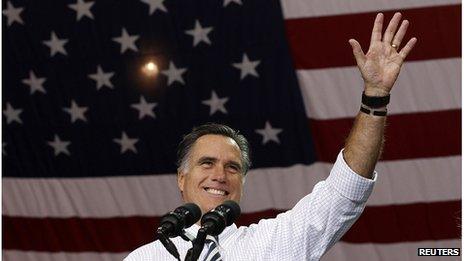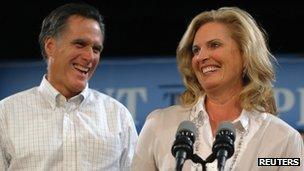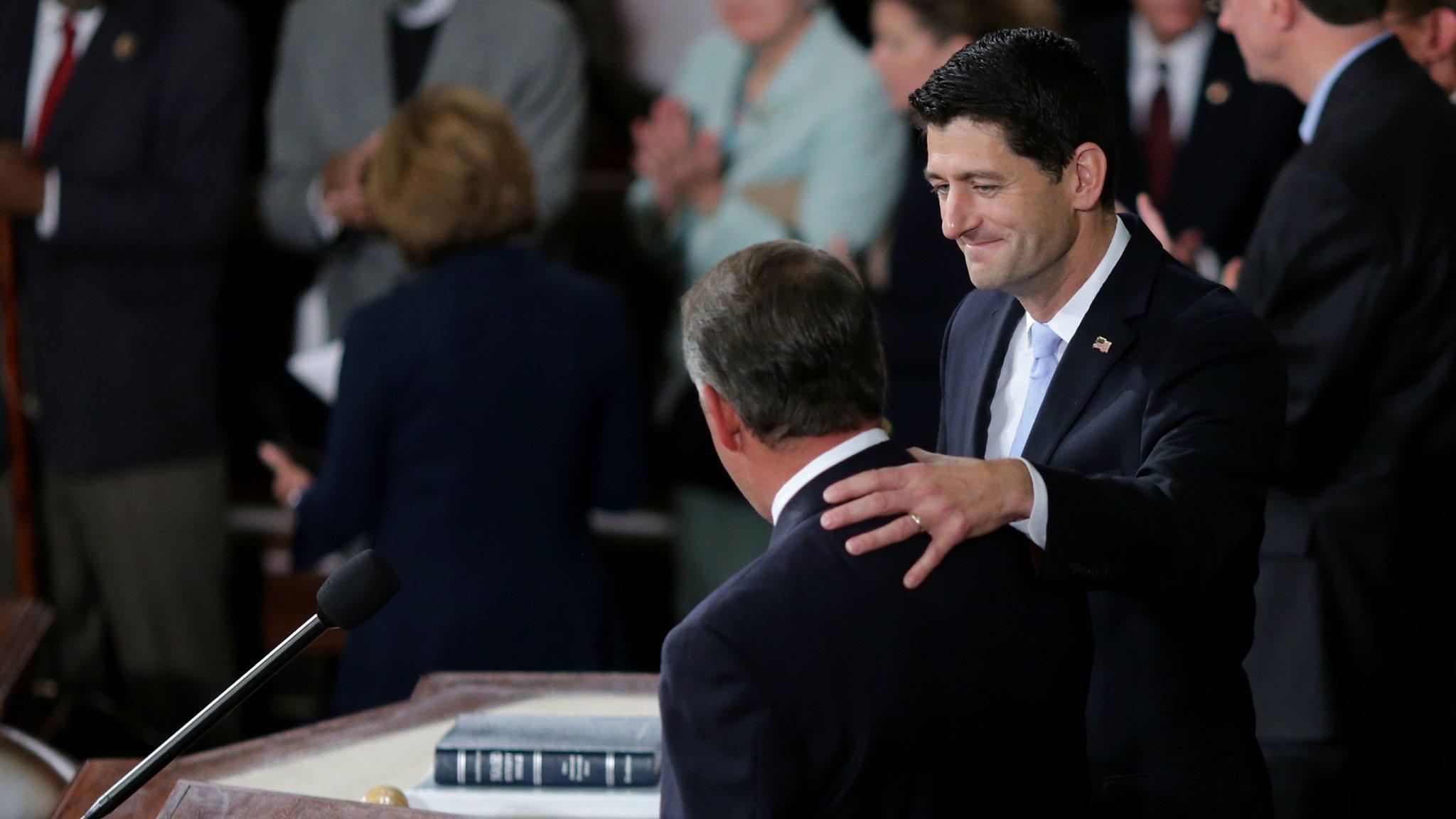Profile: Mitt Romney
- Published

Mitt Romney entered the 2012 Republican presidential race as the presumed front-runner. He maintained that status throughout primary season as one challenger after another self-destructed.
Mr Romney, a former one-term governor of Massachusetts, brought to the race wealth, business experience, a national profile and a broad network of fundraisers and supporters left over from his failed 2008 White House bid.
With his square jaw, gleaming eyes and immobile hair greying at the temples, he could be a presidential candidate straight from central casting. He has been married to his high-school sweetheart, Ann Romney, since March 1969.
Mr Romney lost the party's 2008 nomination race to Arizona Senator John McCain but took only a brief break from the campaign trail. Almost as soon as Barack Obama was in the White House, Mr Romney began building support for the 2012 contest.
He hoped that his background in business would help him convince voters that he, not President Obama, was the man to manage America's halting economic recovery.
To win the Republican party nomination, Mitt Romney had to convince primary voters of the authenticity and depth of his conservative principles, and to overcome scepticism about his Mormon faith.
He also sought to persuade them to overlook his relatively liberal record as governor of Massachusetts, a solidly Democratic state.
Yet in the months following his coronation at the Republican convention in Tampa Mr Romney gradually sought to reclaim the centre ground he left behind during a bruising primary process.
He insisted that Mr Obama had let America down during his four years in office, criticising his economic record and his foreign policy - especially after four Americans were killed in a terror attack in Benghazi, Libya, in September.
Mr Romney convincingly won the first presidential debate, positioning himself as a candidate for all Americans and a champion of the middle class.
Weeks earlier he was criticised after the emergence of a secretly taped recording in which he derided 47% of Americans as dependent on the state.
But he was unable to repeat the Denver debate triumph in the following two contests, and was forced to take a step back from campaigning just a week before election day when Storm Sandy hit the US East Coast.
Blue state, red governor
Willard Mitt Romney was born in 1947 in Michigan. His father, George Romney, was later that state's Republican governor and himself ran for the Republican presidential nomination in 1968.
Mitt Romney served two years as a Mormon missionary in France, then went to Brigham Young University and studied law and business at Harvard.

The candidate's wife, Ann Romney, is often by his side on the campaign trail
Later, Mr Romney took a senior position in the Mormon church and joined Boston management consulting firm Bain and Company, soon rising to chairman. He founded venture capital firm Bain Capital, and became a hugely successful corporate figure.
Bain and Bain Capital made Mitt Romney a very rich man, and his wealth and corporate record were used repeatedly by the Obama campaign once he won the nomination in an effort to define him as a "corporate raider" in the eyes of voters.
In 1994, Mr Romney attempted to unseat veteran Democratic Senator Ted Kennedy. He lost but raised his profile in the state and among Republicans nationally.
In 1999 he was tapped to run the 2002 Salt Lake City Winter Olympics. Preparations had been mired in scandal, and organisers were attracted to Mr Romney's deep connections within the Mormon church, his business acumen and his reputation for honesty.
The 2002 Olympics were widely viewed as a success. Later that year Mr Romney ran for governor of Massachusetts as a pragmatic centrist, allaying fears he would foist right-wing social policies on the liberal state. He won.
As governor, he signed into law a comprehensive healthcare overhaul that required all Massachusetts residents to obtain health insurance and provided subsidies to those who could not afford it or who did not receive it from their employers.
That policy threw Mr Romney on the defensive time and again during his bid for the White House.
Critics accuse the former governor of laying the groundwork for Mr Obama's own 2010 healthcare plan, which is detested by Republicans but conceptually similar to the programme Mr Romney signed into law in 2006.
Even before he officially announced his 2012 candidacy, Mr Romney made a speech defending the Massachusetts policy while attacking Mr Obama's programme.
Over the course of the campaign he has also faced questions about his commitment to social conservative principles.
During his tenure as Massachusetts governor, a court ruling made the state the first to allow same-sex marriage.
Mr Romney gave a qualified criticism of that decision, saying marriage laws should only be altered by a vote of the people, and sought to build support for a state constitutional amendment banning same-sex marriage.
The real thing?
Mr Romney opted not to seek re-election in 2006 to explore a presidential run.
In the 2008 race, Mr Romney sought to cast himself as a conservative whose success in Massachusetts indicated he could win over Democratic and independent voters.
But Mr Romney was never able to overcome doubts about his authenticity and accusations he had shifted his positions on abortion and gay rights merely to appeal to the more conservative national Republican electorate.
He pulled out of that race in February after spending $35m (£21.4m) of his own money.
This time around, Mr Romney sought to remain above the fray by training his fire on the president rather than on his rivals for the Republican nomination.
And his experience from the 2008 race proved valuable, in particular in a gruelling series of televised debates.
He consistently led the pack in fundraising and in the polls, though some Republican voters egged on other candidates to challenge him from the right-wing.
The Romney campaign and its backers spent large sums on advertising in the primary season as he sought to define himself as an acceptable candidate to the staunchly conservative primary electorate.
In one speech Mr Romney described himself as "severely conservative" - a label the Obama campaign seized on in later months in an effort to sway undecided voters.
After a string of primary wins, Mr Romney built up a significant lead in delegates and the Republican establishment coalesced behind him despite earlier misgivings.
One by one his challengers left the race, and he was able to secure the nomination after the Texas primary in May.
- Published11 April 2018
